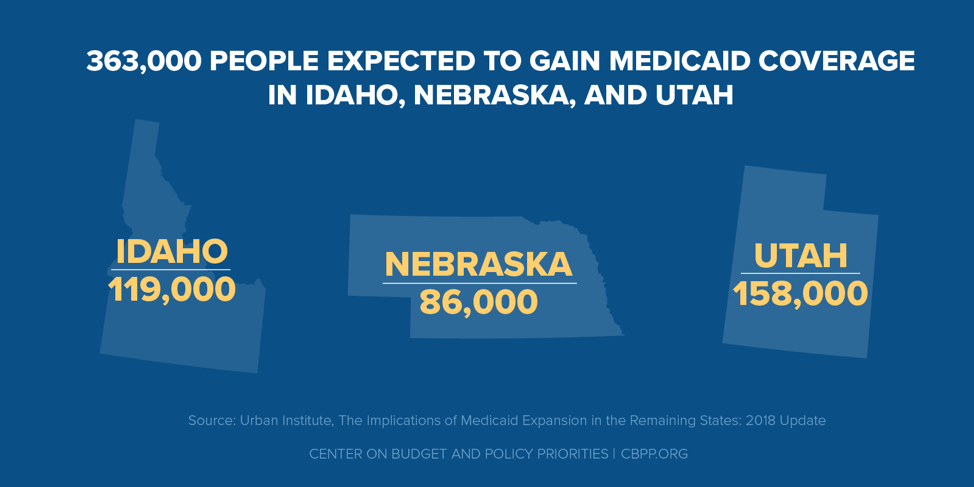más allá de los números
States Should Quickly Implement Voter-Approved Medicaid Expansions
Idaho, Nebraska, and Utah voters approved ballot initiatives yesterday to adopt the Affordable Care Act’s (ACA) Medicaid expansion that, when implemented, will provide Medicaid coverage to an estimated 363,000 more people.

The 31 states (plus the District of Columbia) that have implemented the expansion have benefited greatly, as we’ve detailed: uninsurance rates have dropped more in expansion states overall than in non-expansion states, the expansion has produced budget savings that offset much of the costs from expanding Medicaid coverage, those who gained Medicaid coverage report improved physical and financial health, and the expansion has proved a crucial work support both for those who are working as well as those looking for work.
For their states to enjoy these benefits, policymakers in Idaho, Nebraska, and Utah should quickly implement their expansions. To do that, they should:
- Move quickly to submit state plan amendments (SPAs). Each state’s ballot initiative requires the state to submit the necessary SPAs to the federal Centers for Medicare and Medicaid Services (CMS) for Medicaid expansion coverage to take effect by early 2019. CMS usually approves SPAs within a few weeks or months, and a SPA is the quickest and simplest way for a state to begin to provide coverage under its Medicaid expansion. When Louisiana Governor John Bel Edwards expanded Medicaid through a SPA in January of 2016, coverage began on July 1.
- Pursue streamlined enrollment strategies. States have the option to identify participants in SNAP (formerly food stamps) who are certain to be eligible for Medicaid, notify them that they may qualify, and ask if they want to enroll. That lets states enroll large numbers of eligible people quickly, and without having to furnish duplicative paperwork. Recent expansion states like Louisiana and Virginia (where coverage begins on January 1) have successfully used this option.
- Avoid policies that create barriers to coverage and care. The Trump Administration has approved Medicaid waivers in five states that let them charge beneficiaries premiums and increase their cost-sharing, as well as take coverage away from beneficiaries who don’t meet rigid work requirements. These requirements are complex and confusing, leave fewer people enrolling in coverage, and don’t improve health outcomes. As noted, the initiatives that voters in Idaho, Nebraska, and Utah passed require each state to make the expansion take effect through a SPA, and policymakers should avoid taking any steps that would make it harder for people to enroll in coverage.
If all remaining non-expansion states (including Idaho, Nebraska, and Utah) adopted the expansion in 2019, more than 4.5 million uninsured people would gain coverage and uninsurance rates in these states would fall by a quarter, according to Urban Institute projections.
Last night’s election results indicate that some additional states may pursue Medicaid expansion in 2019. Maine elected a governor who supports the expansion, which means that the expansion initiative that voters passed last year (and which outgoing Governor Paul LePage refused to implement) will likely take effect in 2019. And voters in Kansas and Wisconsin elected governors who made their support for Medicaid expansion central to their campaigns.
